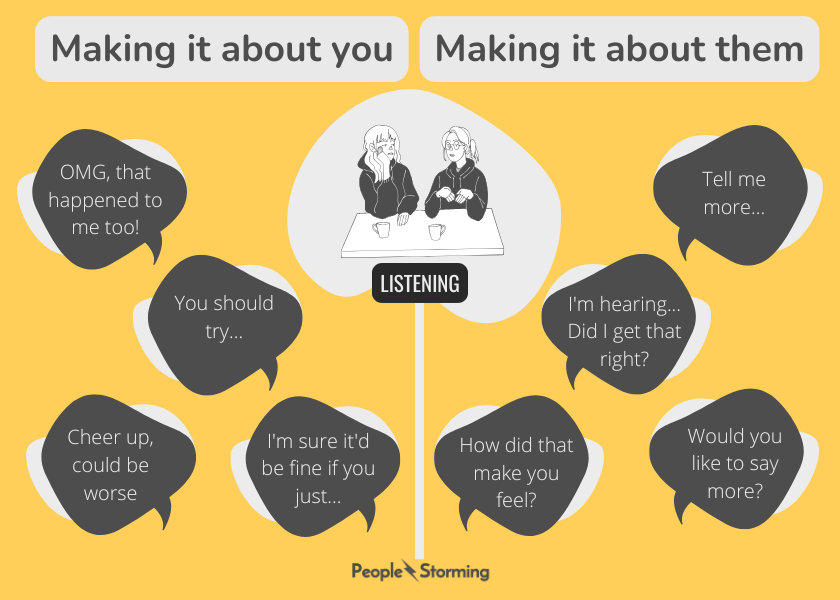Take a look at the image above. It’s our attempt to capture the world of difference between making a conversation self-focused or making it about everyone present.
The former approach is all too common. We become preoccupied with our own experiences, concerns and reactions, rather than focusing on the perspectives of others. Put differently, we worry whether we’re individually performing well rather than whether the conversation is effective.
The consequences of this bias have been made clear in literature stretching back decades. Creativity, inclusivity, understanding, exploration, relationships and even simple joy are all diminished when we focus on speaking well rather than listening well.
Listening Well
So what does it mean to listen well? It starts with a shift in mindset - instead of thinking about how we're going to respond, we focus solely on understanding the other person. We resist the urge to interrupt, make assumptions or steer the conversation in a particular direction. Instead, we ask clarifying questions, paraphrase what we've heard, and create a safe space for the speaker to fully express themselves.
Of course, shifting our listening habits isn't always easy. We all need ‘training wheels’ when we’re first practicing to listen better. One powerful technique is to focus not only on what another person is saying but also on their tone, body language and word choice. What are they really trying to convey? How might their background and experiences be shaping their perspective?
Beyond that ‘hyper-attentive’ mode, there is a specific exercise we like for deliberately fostering better listening amongst colleagues. It’s called The Reflection Exercise.
The Reflection Exercise
This structured exercise helps train the habit of listening deeply and reflecting back what you've heard, rather than merely waiting for your turn to speak. Here's how it works…
Find a partner and decide who will go first as the speaker.
The speaker shares a personal story, opinion or experience for 2-3 minutes. It should be something relatively light and low-stakes, not a deeply personal topic.
Once the speaker finishes, the listener takes a moment to collect their thoughts. They then summarize what they heard, reflecting back the key points, emotions and perspectives expressed by the speaker.
The listener does not provide any advice, opinions or commentary - their sole focus is to demonstrate that they heard and understood the speaker's message and implications.
After the listener finishes their reflection, the speaker provides feedback on how well the listener captured their intended meaning. Did they miss or misunderstand anything?
Then the roles reverse, with the listener becoming the speaker and the speaker becoming the listener.
Repeat this cycle as many times as available time and energy allow.
This exercise is powerful because it forces the listener to resist the urge to interject or formulate their own response. Over time, this trains the brain to be more attentive, empathetic and focused on understanding the other person's perspective.
If you’d like your managers or your team to become better listeners and better coaches, consider our coaching fundamentals workshop. It’s a two hour highly interactive session that will impart key skills in a way that makes them stick.




